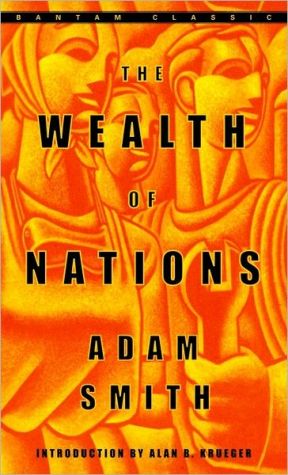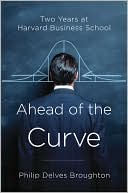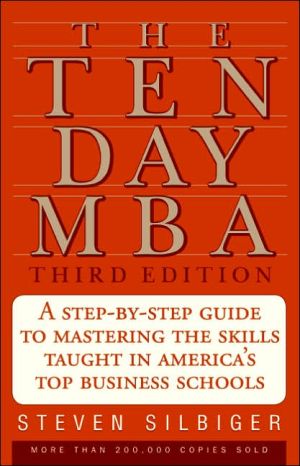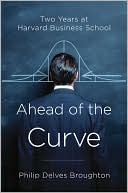From Higher Aims to Hired Hands: The Social Transformation of American Business Schools and the Unfulfilled Promise of Management as a Profession
Is management a profession? Should it be? Can it be? This major work of social and intellectual history reveals how such questions have driven business education and shaped American management and society for more than a century. The book is also a call for reform. Rakesh Khurana shows that university-based business schools were founded to train a professional class of managers in the mold of doctors and lawyers but have effectively retreated from that goal, leaving a gaping moral hole at the...
Search in google:
"I have been waiting for years for someone to write the definitive institutional history of U.S. management education, and this is it. From the standpoint of most analytic definitions of 'professional,' the term 'professional manager' is enigmatic, even oxymoronic. Rakesh Khurana's thorough, insightful, provocative, and courageous history of business education explains how this term came to make practical and cultural sense to a generation of Americans, and how its logic has been undermined in the past thirty years. From Higher Aims to Hired Hands is an exemplary work of institutional analysis, combining first-rate historiography with outstanding social-science scholarship. It will be essential reading for business historians, students of management and organizations, and faculty, administrators, and thoughtful students at America's business schools."--Paul DiMaggio, Princeton University"From Higher Aims to Hired Hands is a tour de force. With profound depth and sweeping scope, Rakesh Khurana analyses the rise and potential fall of a uniquely American institution--one that has influenced management education throughout the world. His book contributes significantly to explaining how managerial capitalism could go awry and how to restore the moral underpinnings that would make management the profession of leadership. In addition to offering fascinating history lessons based on exhaustive research, Khurana adds new twists to institutional theory and points to future directions for educational practice."--Rosabeth Moss Kanter, Harvard Business School, author of The Change Masters, Confidence, and America the Principled: 6 Opportunities for Becoming a Can-Do Nation Once Again"This panoramic portrait of the origins and ramifications of American business education is quite remarkable, rich in detail, powerful in the marshaling of evidence, and provocative in its claims. Khurana writes with confidence, authority, and erudition."--Walter Powell, Stanford University"This is a wonderful and important book for anyone interested in business education. There is a tendency for those of us involved in business education to think that we understand the dynamics of our industry and that there is little new that we can learn. How wrong such a judgment would be. In providing a sociological understanding of the origins of business education and the professionalization of management, this book prompts deep reflection about the state of management today and offers real insight into the challenges of elevating the standards of this particular profession."--Joel Podolny, dean of Yale School of Management John Wilson - Business History Review [U]ntil the publication of From Higher Aims to Hired Hands, nobody had provided such a detailed historical survey leading to conclusions of great significance for American academia and, implicitly, for American corporations. . . . Khurana's book will no doubt continue to stimulate debate on both sides of the Atlantic about both managerial professionalism and the role business schools ought to play in a modern, knowledge-based society.
FROM HIGHER AIMS TO HIRED HANDS\ The Social Transformation of American Business Schools and the Unfulfilled Promise of Management as a Profession \ \ By RAKESH KHURANA \ PRINCETON UNIVERSITY PRESS\ Copyright © 2007 Princeton University Press\ All right reserved.\ ISBN: 978-0-691-12020-1 \ \ \ \ Chapter One\ An Occupation in Search of Legitimacy \ The enormous cadre of salaried managers who administer the affairs of large corporations has become such a dominant and taken-for-granted presence that it requires considerable historical imagination to recognize that there was nothing inevitable about its appearance and development. It was not until the late 1870s that the equivalent of today's modern, salaried manager emerged as a significant, if still vaguely defined, entity. By 1900, the number of managers in organizations had grown dramatically. National statistics are difficult to find, but in the transportation and communications industries, for example, the number of proprietors, officials, managers, and inspectors increased from 12,501 in 1870 to 67,706 in 1900-more than 500 percent. On the eve of World War I, a University of Michigan professor, who would later have an instrumental role in the founding of that institution's business school, reflected on a phenomenon that was attracting the attention of many Americans: "There has begun to emerge a special class of administrators, who are not capitalists, but stand midway between the multitude of stock and bond owners on the one side, and the wage-earning classes and public as consumers on the other." By the early 1920s, managers constituted a sizable and universally recognized occupational group-the 1920 United States occupational census estimated that there were 2,612,525 executive and manager positions in business-whose control of corporations and their resources was firmly established. How did this group invent itself virtually ex nihilo and then rise to such heights of power, all in less than fifty years?\ * The Rise of Management in American Society\ Like any institution that achieves dominance in a society, management has risen to power partly by vesting itself in a series of changing ideological mantles that, over time, have obscured this institution's historically contingent origins. One purpose of this book is to describe why and how this was accomplished.\ Previous accounts of the rise and eventual triumph of management as an occupation have affirmed, albeit unintentionally, that there was something both inevitable and inherently right about this historical trajectory. One of the most influential such accounts was put forth by the Harvard business historian Alfred D. Chandler, Jr., in his classic The Visible Hand. For Chandler, as for other scholars working in the tradition he represents, modern management grew naturally out of the large corporations that arose to take advantage of the national markets created by late nineteenth-century advances in manufacturing, transportation, and communications. Before the Civil War, Chandler notes, there was no such thing as "big business" by any modern definition. The typical business organization was a small enterprise, usually run by an individual owner or a few partners. Such firms often focused on one or two economic activities and operated within a restricted geographic realm. Chandler suggests that the small-firm structure was inherently unreliable and inefficient. Slight and unanticipated changes in the business cycle often doomed a business; indeed, most businesses, then as now, died in infancy. Moreover, Chandler argues, the quality and quantity of goods produced by such enterprises were unpredictable because workers largely controlled the manner and pace of work. Chandler and others working from this perspective claim that the replacement of the market's invisible hand by the "visible hand" of management in the modern business firm represented a kind of Darwinian triumph. A superior form of organization, better suited to evolving economic conditions, had replaced its unreliable and inefficient predecessor. Chandler wrote:\ [M]odern business enterprise took the place of market mechanisms in coordinating the activities of the economy and allocating its resources. In many sectors of the economy the visible hand of management replaced what Adam Smith referred to as the invisible hand of market forces. The market remained the generator of demand for goods and services, but modern business enterprise took over the functions of coordinating flows of goods through existing processes of production and distribution, and of allocating funds and personnel for future production and distribution. As modern business enterprise acquired functions hitherto carried out by the market, it became the most powerful institution in the American economy and its managers the most influential group of economic decision makers. The rise of modern business enterprise in the United States, therefore, brought with it managerial capitalism.\ Chandler argued, specifically, that the visible hand of managers rationalized the structure and operations of business firms in ways that reduced costs and raised productivity:\ By routinizing the transactions between units, the costs of these transactions were lowered. By linking the administration of producing units with buying and distributing units, costs for information on markets and sources of supply were reduced. Of much greater significance, the internalization of many units permitted the flow of goods from one unit to another to be administratively coordinated. More effective scheduling of flows achieved a more intensive use of facilities and personnel employed in the processes of production and distribution and so increased productivity and reduced costs.\ Amid the increased scale and complexity of business in the late nineteenth century, the Chandler argument concludes, it was management's ability to perform crucial economic functions that the market carried out inefficiently-and that owner-entrepreneurs and their partners could no longer perform for themselves-that gave rise to the novel phenomenon of managers running enterprises they did not own.\ Writing in an era in which, as we shall see in part 3, the managerial capitalism whose origins he documented was coming under fierce attack, Chandler adhered to the then-current assumption among institutional economists that (as Frank Dobbin has recently summarized it) "history is efficient when it comes to institutions." That is to say, Chandler offers a teleological view of organizational history in which, if particular organizational forms survive, it is because they perform some function more efficiently than other forms do. The history of organizational change thus recounts a march of progress to ever more efficient modes of organizing.\ More recent research, however, suggests that the transition from entrepreneurial to managerial capitalism was hardly as simple, smooth, or inevitable as Chandler's characterization implies. Examining the emergence of the large corporation from a historical and sociological perspective, legal theorists, sociologists, and organizational behavior researchers take as their point of departure Chandler's economic interpretation of the rise of large corporations. Focusing on the social and political context of the late nineteenth and early twentieth centuries, these scholars note that the period saw a wholesale reconstruction of American society and its institutions. Thus, they argue, explaining the rise of large corporations only in economic terms offers a limited view.\ Analyzing the period's economic, political, and legal discourses, these researchers find that concerns about the role of the corporation were among the preeminent issues in national politics during the late nineteenth and early twentieth centuries. Leading politicians, economists, jurists, and public intellectuals saw the emergence of large corporations as much more than a natural economic event or an objective consequence of technical development. They considered its implications for the law, the role of government, the position of labor, and the relationship between the economy and society. Questions about who should control the large corporation were intertwined with competing economic, social, and political interests that went beyond the issue of the large corporation's efficiency (although shareholders, foreshadowing contemporary debates about corporate control, questioned whether a managerially controlled corporation would act in more economically efficient ways than shareholder-controlled companies). Debate centered on the nature of claims over corporate property, the economic and political consequences of separating ownership from control, class relations, democratic values, and the public interest, as well as on the legitimacy of a new system of social authorities in the form of management and large-scale bureaucracy. Thus researchers seeking to go beyond Chandler's efficiency hypothesis focus on the numerous points beyond the market at which large corporations intersected with society, including legal and political institutions. For example, institutional scholars have emphasized how organizations conform to the normative expectations of other actors in the environment, irrespective of considerations of efficiency. Network theorists have demonstrated how economic relations are embedded in social relations. Scholars examining the role of power underscore how the dynamics of power between state regulators and corporate executives affect organizational structure and strategy.\ The development of economic institutions, in other words, is not simply a function of their efficiency; rather it often results from the outcome of contests in the legal, political, social, and cultural realms. Understanding why institutions such as large corporations and professional management evolved as they have therefore requires us to consider two phenomena that Chandler largely neglects.\ The first of these is social context. Examination of the social context in which the large corporation arose, and of how this new entity was regarded by society, shows that the birth of the corporate structure represented more than a simple adaptation by firms to new technological and market conditions. It was also linked to emerging social, intellectual, and cultural conditions and, indeed, to the disruption of an entire social order. Some of the social conditions coincident with the rise of the large corporation are already so well known as to require no further elaboration here-for example, the rapid population growth in American cities (the result of both immigration and internal migration from rural areas between 1880 and 1900), which was not only a response to industrialization but also a spur to its advance. Other social conditions played critical (though perhaps less obvious) roles in creating the conditions necessary for the emergence of managers and managerial activities. For example, the rapid spread of literacy in the decades following the Civil War created a cadre of individuals capable of performing the new kinds of managerial tasks that Chandler describes, such as establishing detailed work steps, devising organizational structures and timetables for achieving necessary results, monitoring those results, and providing policies and procedures to monitor work activity.\ The second important phenomenon associated with the creation of any new institution, but marginalized by Chandler, is agency. Chandler's account of the rise of the large corporation and of management ignores the role of specific individuals, groups, or classes so completely that a reader might think organizations were unaffected by the interested actions of human beings who populate organizational structures. The efficiency explanation of the origins of the modern corporation and of contemporary management ignores, in particular, the agency of what Paul DiMaggio refers to as institutional entrepreneurs, and how such actors create institutions in an effort to make the environment more amenable to their interests. As DiMaggio writes, "[it is] necessary to bring interest and agency more centrally onto the institutional stage, to recognize that institutions have never 'developed and operated without the intervention of interested groups, groups ... which have different degrees of power.'" Here he is quoting the organizational sociologist Alvin W. Gouldner, who further observed that the persistence of an institution often represents the "outcome of a contest between those who want it and those who do not." Social scientists studying the emergence of new institutions must, therefore, examine the role of agents' claims and how these are conditioned by individual biography, institutional affiliations, vested interests, and the social location of the agents themselves. Applied to the institutions with which we are here concerned-large corporations and management-this approach requires consideration of how managers actively created the necessary conditions for expansion of both their organizations and their own managerial power in contests that were not just economic but also political, cultural, and social in nature.\ Recent study of the early history of the large corporation in America and the history of management has focused attention, for example, on legal and political contests over the concentration of economic power in corporations and the question of who should be permitted to wield this power. The outcomes of such contests, scholars have shown, were crucial to both corporate expansion and the legitimation of managerial authority. While managerial control over large corporations has been recognized since the 1932 publication of Berle and Means's classic volume, The Modern Corporation and Private Property, it was the legal scholar Mark J. Roe who first argued, some sixty years later, that this control was a hard-won prize, not an uncontested benefice. Establishing managerial authority required managers to wrest control of their organizations from entrepreneurial owners and controlling shareholders, many of whom remained suspicious of these newcomers even as they became increasingly reliant on them for running their enterprises. Roe's emphasis on the legal context of the large, multidivisional firm's emergence grounds his argument in historical contingency that Chandler largely neglects. Roe demonstrates, for instance, that, as nonowner executives exerted greater control over American corporations, a counterforce of well-organized and resourceful financial interests sought, through recourse to politics and the legal system, to retain their own control over these organizations. Shareholders, in other words, did not passively accept managerial control over the corporation. Many believed that managerial control was neither desirable in itself nor more efficient than the available alternatives. Large financial intermediaries such as investment banks, insurance firms, and trusts pooled resources in a concerted effort to exert their property rights. They did this through a combination of mechanisms: wielding political influence to modify state incorporation laws in favor of owners; pyramiding ownership through trusts, cross-shareholding, and interlocking directorates; and controlling corporate proxies. While ultimately unsuccessful, their efforts demonstrate how interested actors, not just abstract considerations of efficiency and productivity, operated during the rise of managerial capitalism.\ Three recent sociological studies-although dealing only indirectly with the issue of managerial authority and control-lend substantial support to Roe's focus on the legal context in his account of the rise of the modern corporation and contemporary management. These studies demonstrate that the institutionalization of the large corporation and of managerial control over it was, at its root, a political process reflecting the relative power of the organized interests and social actors who mobilized around, and were mobilized by, those interests. Neil Fligstein, for example, has suggested that legislation such as the Sherman Antitrust Act, although framed by its supporters as a constraint on the growth of large corporations, actually facilitated a merger and consolidation wave in the United States by making coordination among firms in similar industries unlawful. Using a large, multi-industry sample of early twentieth-century corporations, William G. Roy has found no statistical support for Chandler's primary hypothesis that firms in technologically advanced industries with the fastest-growing markets were able to significantly reduce costs through economies of scale. His research suggests, in fact, that the major link between scale and firm profitability was via market power, which reduced overall competition in particular industries. Roy has also demonstrated that the merger wave that swept across several American industries in the early twentieth century was not a function of scale economies but, rather, a consequence of changes in state incorporation laws that enabled corporations to own other corporations.\ (Continues...)\ \ \ \ \ Excerpted from FROM HIGHER AIMS TO HIRED HANDS by RAKESH KHURANA Copyright © 2007 by Princeton University Press. Excerpted by permission.\ All rights reserved. No part of this excerpt may be reproduced or reprinted without permission in writing from the publisher.\ Excerpts are provided by Dial-A-Book Inc. solely for the personal use of visitors to this web site. \ \
Introduction: Business Education and the Social Transformation of American Management 1The Professionalization Project in American Business Education, 1881-1941An Occupation in Search of Legitimacy 23Ideas of Order: Science, the Professions, and the University in Late Nineteenth- and Early Twentieth-Century America 51The Invention of the University-Based Business School 87"A Very Ill-Defined Institution": The Business School as Aspiring Professional School 137The Institutionalization of Business Schools, 1941-1970The Changing Institutional Field in the Postwar Era 195Disciplining the Business School Faculty: The Impact of the Foundations 233The Triumph of the Market and the Abandonment of the Professionalization Project, 1970-the PresentUnintended Consequences: The Post-Ford Business School and the Fall of Managerialism 291Business Schools in the Marketplace 333Epilogue: Ideas of Order Revisited: Markets, Hierarchies, and Communities 363Acknowledgments 385Bibliographic and Methods Note 387Notes 397Selected Bibliography 483Index 509
\ The Wall Street JournalIf Prof. Khurana wanted to torment business—school deans, alumni and current students, he couldn't have picked a better way. Prof. Khurana has identified an important imbalance. In the current environment, many brilliant young MBAs don't aspire to be corporate chief executive officers, who struggle to uphold their agendas against pressure from all sides. These students would rather be consultants who earn big money fomenting change. Better yet, they want to be the powerful investors who hire and fire CEOs.\ — George Anders\ \ \ \ \ The EconomistA fascinating history of business education.\ \ \ Strategy & BusinessIn From Higher Aims to Hired Hands, Khurana, a management professor at the Harvard Business School best known for his writing on leadership, has produced an instant classic. . . . [I]t is an evenhanded, comprehensive, and exhaustively documented work demonstrating how the history of the American business, reflecting the evolution from 19th-century entrepreneurial capitalism to mid-20th-century managerial capitalism to today's investor capitalism. Criticisms of today's business schools abound, but Khurana provides the historical perspective needed to understand how those institutions became what they are.\ \ \ \ \ Professional ManagerThe book is an impressive and thouroughly researched work reviewing the social history of American business education.\ — Andrew May\ \ \ \ \ Society and Business ReviewNot only is this book fully documented and well-written, but its author also achieves here a truly complete social science analysis. . . . It is a pleasure to discover such a meticulous work that is not only methodologically strong but is also conceptually powerful. The quality of this historical work is enriched by its developments in social sciences which allow an exceptional production. . . . [T]he work done here by Khurana remains both strong and riveting.\ — Yoann Bazin\ \ \ \ \ Biz Ed Magazine\ It is not uncommon today for critics to ask if business schools have lost their way, but Harvard's Rakesh Khurana poses the question against such a vivid, detailed, and compulsively researched historical background that it becomes more provocative than ever.\ \ \ \ \ Strategy + Business\ In From Higher Aims to Hired Hands, Khurana, a management professor at the Harvard Business School best known for his writing on leadership, has produced an instant classic. . . . [I]t is an evenhanded, comprehensive, and exhaustively documented work demonstrating how the history of the American business, reflecting the evolution from 19th-century entrepreneurial capitalism to mid-20th-century managerial capitalism to today's investor capitalism. Criticisms of today's business schools abound, but Khurana provides the historical perspective needed to understand how those institutions became what they are.\ \ \ \ \ The Wall Street Journal\ - George Anders\ If Prof. Khurana wanted to torment business—school deans, alumni and current students, he couldn't have picked a better way. Prof. Khurana has identified an important imbalance. In the current environment, many brilliant young MBAs don't aspire to be corporate chief executive officers, who struggle to uphold their agendas against pressure from all sides. These students would rather be consultants who earn big money fomenting change. Better yet, they want to be the powerful investors who hire and fire CEOs.\ \ \ \ \ Times Higher Education Supplement\ - Gary L. Cooper\ The book is extremely well written and provides a detailed historical account of US business education from the 1880s to the present day...This text will help many of us in business schools to think about who we are and where we need to go in future. Rakesh Khurana has done a great service to management education with this scholarly and important book.\ \ \ \ \ Time Magazine\ - Tiffany Sharples\ Is corporate management a real profession? The intellectual rigor that legitimized business schools and turned the M.B.A. into a recognized credential has fallen by the wayside, argues Khurana, an associate professor at Harvard Business School. Instead of producing young professionals, he says, business schools are treating students as consumers and their education as a commodity. Exhaustively researched, Khurana's book examines the birth of the managerial class, the rise of the business school as an academic institution and what he calls its recent deterioration. This failure has created a climate ripe for corruption, and Khurana issues a call to arms for business schools to take back the high ground.\ \ \ \ \ Times Higher Education\ - Malcolm Gillies\ Khurana's is an insightful work of sociology and of history. It is about the business school's many transformations in relation to professions and disciplines; in relation to the changing face of capitalism through its progressive, depressive, managerial and investor phases; in relation to societal and industrial expectations; and in relation to public interest and self-interest.\ \ \ \ \ Observer\ - Simon Caulkin\ Khurana's meticulously researched account ends with a call for renewal of the idea of management as a profession. . . . Coming as it does out of Harvard, the most iconic of business schools, From Higher Aims . . . could hardly be a more provocative and timely intervention. . . . Anyone remotely interested in management and its future should get hold of it—and ignore its lessons at their peril.\ \ \ \ \ BusinessWeek\ - Hardy Green\ Khurana's From Higher Aims to Hired Hands is an important and surprisingly disparaging look at business-school education in the U.S. from the late 19th century to the present....In the new volume, he strikes closer to home, concluding that 'fundamental questions exist as to whether business schools retain any genuine academic or societal mission'...As Khurana supplies layer upon layer of evidence in this admittedly dense work, it becomes increasingly difficult to disagree with his conclusions.\ \ \ \ \ EH.net\ - Donald Stabile\ Khurana presents his argument in rich detail and the book is worth reading by anyone interested in the current trends in the commercialization of academia.\ \ \ \ \ American Historical Review\ - Neil Fligstein\ Rakesh Khurana's sweeping history of American business schools offers a bold overview and a moral message.\ \ \ \ \ Times\ - Des Dearlove\ Khurana's criticism is measured—and is the more damning for it. His book is an impressive tour of the social and intellectual history of American university business schools...Drawing on rich archive material, Khurana traces how the fledgling American business schools confronted these challenges with varying strategies during the early 1900s and the Depression, the postwar boom years and recent decades of freewheeling capitalism. The book is, however, more than just an historical odyssey; it is also a heartfelt plea for business schools to rediscover their higher purpose. The university-based business schools were founded to train a professional class of managers akin to doctors and lawyers. But, he argues forcefully, they have retreated from that goal.\ \ \ \ \ Choice\ - J.B. Kashner\ Rarely does one have the pleasure of reading a scholarly work as complete and as comprehensive as From Higher Aims to Hired Hands. Khurana presents a well-crafted social history of the plight of business school education in the context of a broader framework of American higher education? Khurana exposes inadequacies in current business education programs and advocates for needed reforms.\ \ \ \ \ Journal of Higher Education\ - Kevin T. Leicht\ This is a powerful, compelling, and well-researched narrative. . . . Far from a nihilistic rant about the state of American business education, Khurana paints a sympathetic but critical portrait of what this education has become.\ \ \ \ \ Australian Review of Public Affairs\ - Stewart Clegg\ Khurana has produced an excellent institutional history, albeit one in which many of the ingredients were already well-known from earlier accounts. . . . However, these separate accounts had not been stitched together over such a broad canvas as Khurana constructs. The book should be compulsory reading for all Deans of business schools with a concern to learn from history.\ \ \ \ \ Business History Review\ - John Wilson\ [U]ntil the publication of From Higher Aims to Hired Hands, nobody had provided such a detailed historical survey leading to conclusions of great significance for American academia and, implicitly, for American corporations. . . . Khurana's book will no doubt continue to stimulate debate on both sides of the Atlantic about both managerial professionalism and the role business schools ought to play in a modern, knowledge-based society.\ \ \ \ \ Ephemera\ - Nick Butler\ From Higher Aims to Hired Hands provides an invaluable resource for those of us attempting to understand how the university continues to be shaped and transformed by a confluence of economic forces and political interests. For this reason, Khurana's book deserves to be widely read within academia, in the business school and beyond.\ \ \ \ \ Eastern Economic Journal\ - Richard Marens\ [W]hether or not one agrees with the author's argument as to what went wrong and how it might have gone right, this is a highly important work that should be read by anyone with either an interest in the history of American business schools and American management, or a concern for their future roles in our society.\ \ \ \ \ Professional Manager\ - Andrew May\ The book is an impressive and thouroughly researched work reviewing the social history of American business education.\ \ \ \ \ Society and Business Review\ - Yoann Bazin\ Not only is this book fully documented and well-written, but its author also achieves here a truly complete social science analysis. . . . It is a pleasure to discover such a meticulous work that is not only methodologically strong but is also conceptually powerful. The quality of this historical work is enriched by its developments in social sciences which allow an exceptional production. . . . [T]he work done here by Khurana remains both strong and riveting.\ \ \ \ \ Times Higher Education SupplementThe book is extremely well written and provides a detailed historical account of US business education from the 1880s to the present day...This text will help many of us in business schools to think about who we are and where we need to go in future. Rakesh Khurana has done a great service to management education with this scholarly and important book.\ — Gary L. Cooper\ \ \ \ \ Time MagazineIs corporate management a real profession? The intellectual rigor that legitimized business schools and turned the M.B.A. into a recognized credential has fallen by the wayside, argues Khurana, an associate professor at Harvard Business School. Instead of producing young professionals, he says, business schools are treating students as consumers and their education as a commodity. Exhaustively researched, Khurana's book examines the birth of the managerial class, the rise of the business school as an academic institution and what he calls its recent deterioration. This failure has created a climate ripe for corruption, and Khurana issues a call to arms for business schools to take back the high ground.\ — Tiffany Sharples\ \ \ \ \ Times Higher EducationKhurana's is an insightful work of sociology and of history. It is about the business school's many transformations in relation to professions and disciplines; in relation to the changing face of capitalism through its progressive, depressive, managerial and investor phases; in relation to societal and industrial expectations; and in relation to public interest and self-interest.\ — Malcolm Gillies\ \ \ \ \ ObserverKhurana's meticulously researched account ends with a call for renewal of the idea of management as a profession. . . . Coming as it does out of Harvard, the most iconic of business schools, From Higher Aims . . . could hardly be a more provocative and timely intervention. . . . Anyone remotely interested in management and its future should get hold of it—and ignore its lessons at their peril.\ — Simon Caulkin\ \ \ \ \ BusinessWeekKhurana's From Higher Aims to Hired Hands is an important and surprisingly disparaging look at business-school education in the U.S. from the late 19th century to the present....In the new volume, he strikes closer to home, concluding that 'fundamental questions exist as to whether business schools retain any genuine academic or societal mission'...As Khurana supplies layer upon layer of evidence in this admittedly dense work, it becomes increasingly difficult to disagree with his conclusions.\ — Hardy Green\ \ \ \ \ EH.netKhurana presents his argument in rich detail and the book is worth reading by anyone interested in the current trends in the commercialization of academia.\ — Donald Stabile\ \ \ \ \ American Historical ReviewRakesh Khurana's sweeping history of American business schools offers a bold overview and a moral message.\ — Neil Fligstein\ \ \ \ \ TimesKhurana's criticism is measured—and is the more damning for it. His book is an impressive tour of the social and intellectual history of American university business schools...Drawing on rich archive material, Khurana traces how the fledgling American business schools confronted these challenges with varying strategies during the early 1900s and the Depression, the postwar boom years and recent decades of freewheeling capitalism. The book is, however, more than just an historical odyssey; it is also a heartfelt plea for business schools to rediscover their higher purpose. The university-based business schools were founded to train a professional class of managers akin to doctors and lawyers. But, he argues forcefully, they have retreated from that goal.\ — Des Dearlove\ \ \ \ \ ChoiceRarely does one have the pleasure of reading a scholarly work as complete and as comprehensive as From Higher Aims to Hired Hands. Khurana presents a well-crafted social history of the plight of business school education in the context of a broader framework of American higher education? Khurana exposes inadequacies in current business education programs and advocates for needed reforms.\ — J.B. Kashner\ \ \ \ \ Journal of Higher EducationThis is a powerful, compelling, and well-researched narrative. . . . Far from a nihilistic rant about the state of American business education, Khurana paints a sympathetic but critical portrait of what this education has become.\ — Kevin T. Leicht\ \ \ \ \ BizEd MagazineIt is not uncommon today for critics to ask if business schools have lost their way, but Harvard's Rakesh Khurana poses the question against such a vivid, detailed, and compulsively researched historical background that it becomes more provocative than ever.\ \ \ \ \ Australian Review of Public AffairsKhurana has produced an excellent institutional history, albeit one in which many of the ingredients were already well-known from earlier accounts. . . . However, these separate accounts had not been stitched together over such a broad canvas as Khurana constructs. The book should be compulsory reading for all Deans of business schools with a concern to learn from history.\ — Stewart Clegg\ \ \ \ \ Business History Review[U]ntil the publication of From Higher Aims to Hired Hands, nobody had provided such a detailed historical survey leading to conclusions of great significance for American academia and, implicitly, for American corporations. . . . Khurana's book will no doubt continue to stimulate debate on both sides of the Atlantic about both managerial professionalism and the role business schools ought to play in a modern, knowledge-based society.\ — John Wilson\ \ \ \ \ EphemeraFrom Higher Aims to Hired Hands provides an invaluable resource for those of us attempting to understand how the university continues to be shaped and transformed by a confluence of economic forces and political interests. For this reason, Khurana's book deserves to be widely read within academia, in the business school and beyond.\ — Nick Butler\ \ \ \ \ Eastern Economic Journal[W]hether or not one agrees with the author's argument as to what went wrong and how it might have gone right, this is a highly important work that should be read by anyone with either an interest in the history of American business schools and American management, or a concern for their future roles in our society.\ — Richard Marens\ \








